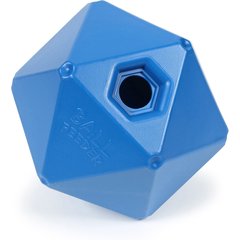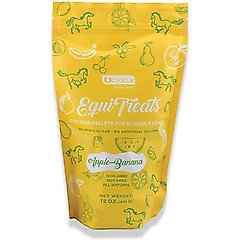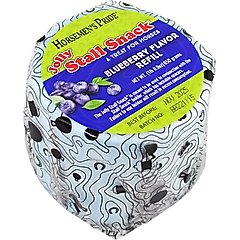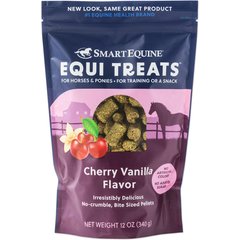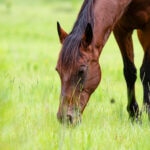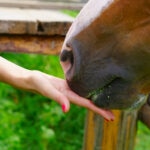Can Horses Eat Watermelon?
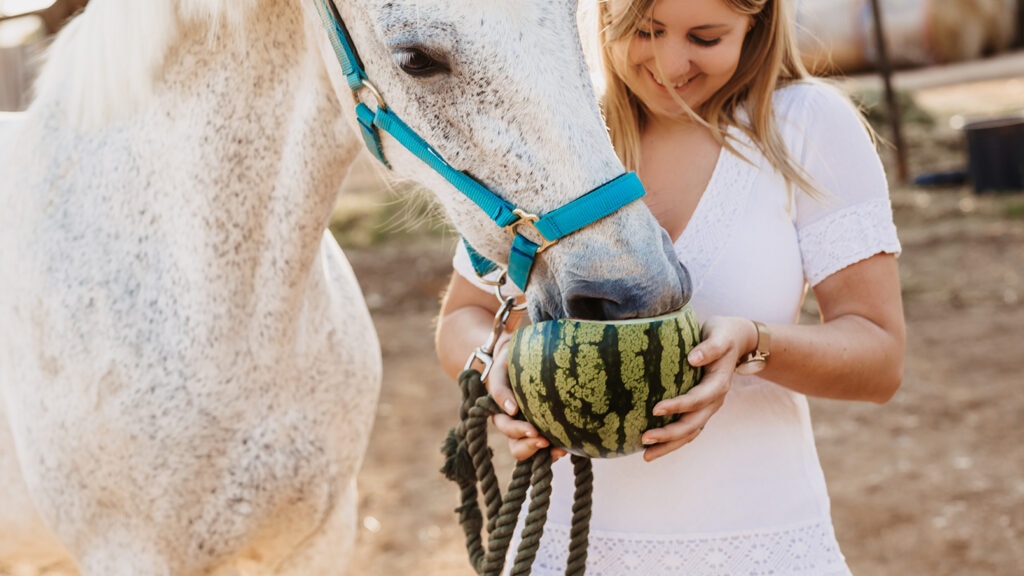
Photo by DianaHirsch/iStock/Getty Images Plus
There’s nothing more refreshing than a slice of cold watermelon on a hot day—and your horse probably agrees. Most horses love the smell and taste of watermelon. But can horses eat watermelon?
Yes! Watermelon is a safe treat for horses, although it should not replace any part of a horse’s normal diet. Like all sugary horse treats, watermelon is best fed in moderation.
Before introducing any new food into your horse’s diet, always check with your veterinarian.
Can Horses Have Watermelon?
Yes, horses can have watermelon. All parts of a watermelon are considered safe for most healthy horses to eat, including the flesh, seeds, and rind.
However, keep in mind that watermelon may be safer for some horses than others.
“If you have a horse [who] doesn’t chew carefully, I worry about the rinds,” says Merle DerVartanian, DVM, of Conejo Valley Equine in Thousand Oaks, California. “I, luckily, haven’t seen a patient who choked on a piece of watermelon rind, but I would definitely not feed large pieces of watermelon rind to a horse with compromised teeth.”
Store-bought watermelon-flavored treats for horses, like Uckele Equi Treats Watermelon Basil Pellets, are also a safe way for horses to enjoy watermelon.
Recommended Product
Avoid sweetened, processed watermelon products, such as juices or candy; they’re a less healthful choice for horses than fresh watermelon.
Is Watermelon Good for Horses?
Watermelon can be good for horses in moderation, especially in summer heat or after hard work.
“Watermelon, as the name implies, is over 90% water, so for hydration, it’s a tasty treat,” says ProTrition nutritionist Grey Parks, MS.
Besides water, watermelon does contain some important nutrients, including the following:
- Lycopene, an antioxidant that may fight cancer, heart disease, and other health issues related to inflammation
- Vitamin A, which supports connective tissue and bone health
- Vitamin C, which strengthens the immune system
- Vitamin B6, which is helpful for digestion and nerve health
However, feeding enough watermelon to provide significant levels of those nutrients to a 1,000-pound horse would result in excess sugar consumption. So, watermelon should be seen as a tasty, hydrating treat for horses, not a replacement for any part of a balanced equine diet.
Is Watermelon Bad for Horses?
Fed as a treat in small amounts, watermelon is safe for most horses. However, there are a few potential risks to keep in mind:
- Choking hazard: Large pieces of watermelon, especially the rinds, may be a choking hazard.
- Contains sugar: Watermelon isn’t suitable for horses who are sensitive to sugar, such as those with a history of laminitis, insulin resistance, or equine metabolic syndrome.
- May lead to dietary imbalance: Frequently feeding excessive treats may reduce how much hay horses eat, leading to dietary imbalances over time.
- Can cause upset stomach: Any new treat can potentially upset a horse’s digestive system, especially if fed in large quantities.
Always ask before feeding any treat, including watermelon, to a horse you don’t own. Some horses have allergies, food sensitivities, or other health conditions requiring a restricted diet.
How Much Watermelon Can I Give My Horse?
Fruits, including watermelon, are treats for horses—not an essential part of a well-balanced diet.
Thus, “treats should only make up about 1% of a horse’s daily ration by weight,” says Parks. “So, if your horse weighs 1,200 pounds and eats 30 pounds of feed a day, you can feed them about a quarter-pound of treats per day.”
If you aren’t feeding treats every day, it’s OK to feed a little more on special days—as long as you don’t offer too much of a new food item at once.
Introduce watermelon gradually to horses who haven’t had it before.
“One or two triangles at a time for an average-sized horse,” says Dr. DerVartanian. “I see people feed much more without problems, but some horses are sensitive to sugar, so it’s best to start with a small serving.”
| Horse Size | Serving Size | Frequency |
|---|---|---|
| Small (under 600 pounds) | 2–4 ounces | Daily or every other day |
| Average (600–1,100 pounds) | 4–8 ounces | Daily or every other day |
| Large (1,000+ pounds) | 4–16 ounces | Daily or every other day |
Keep in mind that this serving size includes all treats. So, if you feed your horse a quarter-pound of horse cookies every day, you shouldn’t also give them a daily quarter-pound of watermelon.
How To Safely Feed Watermelon to Horses
Most horses will eagerly eat watermelon in just about any form. To feed watermelon to horses in the safest way possible, follow these steps:
- Wash the rind. Humans don’t always wash watermelon rinds before eating, because we only eat the fruit. But most horses love watermelon rinds, so give them a rinse!
- Cut the watermelon into small chunks. You can serve horses small cubes of whole melon, rind and all, or eat the fruit yourself and just offer your horses the rind. Either way, chop it into small pieces to reduce the risk of choking.
- Serve in a feed bucket or feed pan. Watermelon is juicy, so feeding it by hand can be dangerous. Your fingers will end up smelling delicious, and your horse might accidentally take a bite.
Recommended Products
- Or use a foraging toy. A bucket of watermelon provides a few minutes of enjoyment, but watermelon in a foraging toy like a treat ball, like the Shires Equestrian Products Ball Horse Feeder, can keep your horse occupied and happy for much longer. (Choose a foraging toy that can be easily washed—it’ll be sticky after being filled with watermelon.)
Recommended Product
- Remove any uneaten watermelon. Most horses will eat as much watermelon as they’re given, but if you have a picky eater who leaves a few chunks in their bucket, take the leftovers away after a couple of hours to avoid attracting pests.
My Horse Ate Too Much Watermelon—What Do I Do?
Maybe you were preparing watermelon for the whole herd, and one horse gobbled the entire batch. Don’t panic—but do give your equine veterinarian a call for advice.
“Eating too much of anything can cause digestive upset, by throwing off the intestinal flora,” says Dr. DerVartanian. “And the sugar could be a problem, especially for horses prone to laminitis.”
Your veterinarian can give more detailed instructions on what to watch for, based on your horse’s health history, but any of the following symptoms could mean your horse needs veterinary treatment:
- Refusing food
- Quiet or absent gut sounds
- Fever
- Diarrhea or inability to pass manure
- Kicking or biting the flanks
- Excessive rolling or refusing to rise
- Sweating in cool weather without exercising
- Sore hooves, especially with a strong digital pulse
- Standing in a “parked-out” stance to take weight off the front hooves
What Other Fruits Can Horses Eat?
It’s not just about apples anymore: A surprisingly wide variety of fruits are safe for horses to eat. Many commercial horse treats now offer unusual fruit flavors.
If you’d like to broaden your horse’s culinary horizons, try one of these:
- Bananas
- Berries
- Melons
- Pumpkins
- Apples
- Grapes
- Cherries (without pits)
Or, check out these pre-made fruit-flavored horse treats:
Recommended Products
FAQs About Watermelon for Horses
Q: Can foals eat watermelon?
A: Nursing foals should not be encouraged to eat treats until they begin eating hay and/or grazing. When your foal can eat a solid meal on their own, they can begin enjoying one or two small chunks of watermelon at a time with your veterinarian’s approval.
Q: Can horses eat watermelon rinds?
A: Yes, horses can eat watermelon rinds. Most horses love them! However, large pieces may pose a choking hazard if not chewed.
Q: Can horses eat watermelon seeds?
A: Yes, horses can eat watermelon seeds. They may be passed undigested, but they won’t hurt your horse.
Q: What fruits are toxic to horses?
A: Avocados are toxic to horses. It’s also best for horses to avoid fruits and veggies in the nightshade family, such as eggplants and tomatoes, as they may upset their stomach. Whole stone fruits can pose a choking hazard for horses. Most stone fruits are safe for horses after the pit has been removed.
Attributions
This content was medically reviewed by Teresa Manucy, DVM, Chewy veterinarian.




